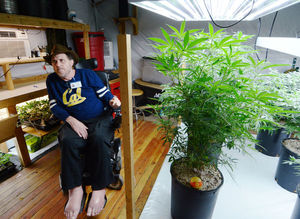
By Mark Stayton, Skagit Valley Herald
Newly licensed marijuana business owners could find themselves with some unexpected competition.
A new federal policy on pot has opened new business options for Native Americans, and the Swinomish are ready to take a look.
The Swinomish Indian Tribal Community will consider the possibilities at a meeting the first week of January, said Swinomish Chairman Brian Cladoosby, following a policy statement recently released by the U.S. Department of Justice.
“We haven’t had an intelligent discussion on it,” said Cladoosby. “It’s definitely something we’d like to look into.”
Meanwhile, marijuana business owners recently licensed under the state Initiative 502 wonder what the impacts will be if marijuana is grown or sold on tribal land, outside of the state-managed system that created a limited number of permits for different processing and retail operations.
Skagit County’s first recreational weed retail store opened in September after the owners were chosen in a lottery that included many months of wrangling for permits and approvals.
“I would think it would negatively impact my business,” said William Keeney, owner of Dank Dynasty, a small marijuana producer and processor in Sedro-Woolley that opened less than two months ago. “I would think that’s going to be hard to compete with.”
A memorandum from the Justice Department has opened the door for Native American tribes seeking to grow and sell marijuana on tribal lands, provided they follow federal guidelines adopted by states that have legalized it.
Priorities for U.S. attorneys listed in the memorandum centered on prevention of serious marijuana-related threats such as trafficking, the funding of gangs and cartels, drugged driving and violence.
The potential for revenue, as well as public health hazards, will need to be assessed by each tribe individually, said Cladoosby, who is also president of the National Congress of American Indians and president of the Association of Washington Tribes.
Cladoosby said the potential for millions if not billions of dollars in revenue might be possible for tribes in Washington alone. Swinomish tribal leaders will review the situation at an upcoming meeting and seek legal advice, he said.
“Even though the state had legalized (marijuana), it is still illegal in tribes. Now we will re-evaluate that to see if that’s something we want to reverse course on,” Cladoosby said.
However, the potential for substance abuse could be a dissuading factor for many tribes, Cladoosby said.
“Native Americans statistically have the highest rates of drug and alcohol abuse of any sector of society,” Cladoosby said. “It’s a tough call for tribal leaders because of that problem.”
The Justice Department will deal with tribes on a case-by-case basis, said Justice spokesman Wyn Hornbuckle.
“Some tribes are very concerned with public safety implications, such as the impact on youths, and the use of tribal lands for the cultivation or transport of marijuana, while others have explored decriminalization and other approaches,” Hornbuckle said in an email.
“Each U.S. Attorney will assess the threats and circumstances in his or her district and consult closely with tribal partners and the Justice Department when significant issues or enforcement decisions arise in this area.”
However, the memorandum states it does not alter U.S. authority or jurisdiction to enforce federal law where marijuana is illegal under the Controlled Substance Act.
The state Attorney General’s Office said Wednesday that it does not consider marijuana legal on tribal lands in Washington but offered no further comment.
The original memorandum, issued by Deputy Attorney General James M. Cole on Aug. 29, 2013, allowed marijuana businesses and the state regulatory system to move forward without fear of federal reprisal, said Brian Smith, spokesman for the state Liquor Control Board.
“It was an assurance for us that we were on the right track, and it brought a sigh of relief from people in the industry, that if they started a business, the government would not swoop in and seize all their assets,” Smith said.
“We didn’t know, when we were building our system, that the federal government was not going to stop this on a dime.”
The Aug. 29 memorandum notes that “jurisdictions must provide necessary resources and willingness to enforce their laws and regulations in a manner that does not undermine federal enforcement priorities.”
If tribes do start growing and selling marijuana, the structure of the industry would determine impacts to businesses licensed under I-502.
Keeney said he would likely go out of business if tribes could sell on Washington’s marketplace at lower prices.
“If the tribes are allowed to do commerce with the state, we’ll probably have to pack it in. I don’t think we could compete with that. The market will become flooded,” Keeney said.
Nate Loving, owner of the Loving Farms retail marijuana store in Mount Vernon, said he believes in tribes’ right to grow and process on their own land, but was unsure how retail sales would be addressed.
“I think it’s a good deal if they want to grow on their own land. Why shouldn’t they be able to do it?” Loving said. “Being that (the Liquor Control Board) already allotted licenses, I don’t know if they’ll add extra stores. They have a set number of licenses.”
Smith said much is still unknown as to how tribal marijuana business would be regulated and which agency would be responsible for it, or how it would integrate with the state’s recreational marijuana system.
He said the board will first need to convene and talk with its attorneys before taking any other action.
“What the memo seems to say is the Cole Memorandum applies to tribal lands the same way it applies to the state. There’s a lot of moving parts that are involved with that,” Smith said. “I don’t think anyone has any or all of those answers yet. I think people were surprised it was as wide open as it was.”


